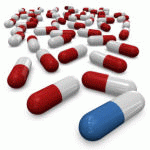Pharmacology
|
13 september 2019 21:04:01 |
| Marine Drugs, Vol. 17, Pages 533: A New Look for the Red Macroalga Palmaria palmata: A Seafood with Polar Lipids Rich in EPA and with Antioxidant Properties (Marine Drugs) |
|
Tweet Palmaria palmata is an edible red macroalga widely used for human consumption and valued for its high protein value. Despite its low total lipid content, it is rich in eicosapentaenoic acid (EPA). This seaweed has been scarcely explored with regard to its lipid composition. The polar lipids of seaweeds are nowadays recognized as important phytochemicals contributing to their add value valorization and providing support for claims of potential health benefits. The present study aimed to disclose the polar lipid profile of P. palmata, farmed in an integrated multi-trophic aquaculture (IMTA) through modern lipidomic approaches using high-resolution LC-MS and MS/MS and to screen for the antioxidant properties of this red macroalga. A total of 143 molecular species of lipids were identified, belonging to several classes of polar lipids, such as glycolipids, phospholipids, and betaine lipids. It is noteworthy that the most abundant lipid species in each class were esterified with eicosapentaenoic acid (EPA), accounting for more than 50% of the lipid content. The polar lipid extract rich in EPA showed antioxidant activity with an inhibition concentration (IC) of IC30 = 171 ± 19.8 µg/mL for α,α-diphenyl-β-picrylhydrazyl radical (DPPH?) and IC50 = 26.2 ± 0.1 µg/mL for 2,20-azino-bis-3-ethylbenzothiazoline-6-sulfonic acid radical cation (ABTS?+). Overall, this study highlights that P. palmata farmed in an IMTA framework can be a sustainable source of beneficial lipids with antioxidant activity. Moreover, this red macroalga can be exploited for future applications as a source of lipids rich in EPA for food and feed, nutraceuticals, and cosmetics. |
| 235 viewsCategory: Biochemistry, Molecular Biology, Pharmacology |
 Marine Drugs, Vol. 17, Pages 531: Antioxidant Peptides from the Protein Hydrolysate of Spanish Mackerel (Scomberomorous niphonius) Muscle by in Vitro Gastrointestinal Digestion and Their in Vitro Activities (Marine Drugs) Marine Drugs, Vol. 17, Pages 531: Antioxidant Peptides from the Protein Hydrolysate of Spanish Mackerel (Scomberomorous niphonius) Muscle by in Vitro Gastrointestinal Digestion and Their in Vitro Activities (Marine Drugs)Marine Drugs, Vol. 17, Pages 532: The Anti-Obesity Effect of Polysaccharide-Rich Red Algae (Gelidium amansii) Hot-Water Extracts in High-Fat Diet-Induced Obese Hamsters (Marine Drugs) 
|
| blog comments powered by Disqus |
MyJournals.org
The latest issues of all your favorite science journals on one page
The latest issues of all your favorite science journals on one page



